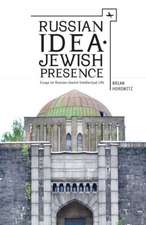Media and Culture in the U.S. Jewish Labor Movement: Sweating for Democracy in the Interwar Era: Palgrave Studies in the History of the Media
Autor Brian Dolberen Limba Engleză Hardback – 9 ian 2017
| Toate formatele și edițiile | Preț | Express |
|---|---|---|
| Paperback (1) | 580.68 lei 6-8 săpt. | |
| Springer International Publishing – 7 iul 2018 | 580.68 lei 6-8 săpt. | |
| Hardback (1) | 585.26 lei 6-8 săpt. | |
| Springer International Publishing – 9 ian 2017 | 585.26 lei 6-8 săpt. |
Din seria Palgrave Studies in the History of the Media
- 18%
 Preț: 787.91 lei
Preț: 787.91 lei - 15%
 Preț: 696.35 lei
Preț: 696.35 lei - 15%
 Preț: 646.11 lei
Preț: 646.11 lei -
 Preț: 211.47 lei
Preț: 211.47 lei -
 Preț: 393.90 lei
Preț: 393.90 lei - 15%
 Preț: 584.43 lei
Preț: 584.43 lei - 15%
 Preț: 700.61 lei
Preț: 700.61 lei - 18%
 Preț: 894.03 lei
Preț: 894.03 lei -
 Preț: 384.48 lei
Preț: 384.48 lei - 18%
 Preț: 738.06 lei
Preț: 738.06 lei -
 Preț: 385.84 lei
Preț: 385.84 lei -
 Preț: 391.61 lei
Preț: 391.61 lei -
 Preț: 449.90 lei
Preț: 449.90 lei -
 Preț: 389.70 lei
Preț: 389.70 lei -
 Preț: 385.47 lei
Preț: 385.47 lei - 15%
 Preț: 584.10 lei
Preț: 584.10 lei - 15%
 Preț: 587.72 lei
Preț: 587.72 lei - 18%
 Preț: 895.27 lei
Preț: 895.27 lei - 15%
 Preț: 589.33 lei
Preț: 589.33 lei - 18%
 Preț: 732.84 lei
Preț: 732.84 lei -
 Preț: 391.61 lei
Preț: 391.61 lei -
 Preț: 391.79 lei
Preț: 391.79 lei - 15%
 Preț: 641.53 lei
Preț: 641.53 lei - 15%
 Preț: 531.59 lei
Preț: 531.59 lei - 15%
 Preț: 645.14 lei
Preț: 645.14 lei - 15%
 Preț: 585.08 lei
Preț: 585.08 lei - 15%
 Preț: 640.88 lei
Preț: 640.88 lei - 15%
 Preț: 586.38 lei
Preț: 586.38 lei -
 Preț: 388.72 lei
Preț: 388.72 lei -
 Preț: 381.59 lei
Preț: 381.59 lei -
 Preț: 386.22 lei
Preț: 386.22 lei -
 Preț: 392.21 lei
Preț: 392.21 lei -
 Preț: 395.47 lei
Preț: 395.47 lei -
 Preț: 387.20 lei
Preț: 387.20 lei - 15%
 Preț: 583.93 lei
Preț: 583.93 lei -
 Preț: 485.99 lei
Preț: 485.99 lei - 15%
 Preț: 582.80 lei
Preț: 582.80 lei -
 Preț: 392.60 lei
Preț: 392.60 lei -
 Preț: 391.61 lei
Preț: 391.61 lei - 15%
 Preț: 698.15 lei
Preț: 698.15 lei - 18%
 Preț: 791.57 lei
Preț: 791.57 lei
Preț: 585.26 lei
Preț vechi: 688.54 lei
-15% Nou
Puncte Express: 878
Preț estimativ în valută:
111.99€ • 116.92$ • 92.69£
111.99€ • 116.92$ • 92.69£
Carte tipărită la comandă
Livrare economică 04-18 aprilie
Preluare comenzi: 021 569.72.76
Specificații
ISBN-13: 9783319435473
ISBN-10: 3319435477
Pagini: 261
Ilustrații: XIV, 256 p.
Dimensiuni: 148 x 210 x 21 mm
Greutate: 0.45 kg
Ediția:1st ed. 2017
Editura: Springer International Publishing
Colecția Palgrave Macmillan
Seria Palgrave Studies in the History of the Media
Locul publicării:Cham, Switzerland
ISBN-10: 3319435477
Pagini: 261
Ilustrații: XIV, 256 p.
Dimensiuni: 148 x 210 x 21 mm
Greutate: 0.45 kg
Ediția:1st ed. 2017
Editura: Springer International Publishing
Colecția Palgrave Macmillan
Seria Palgrave Studies in the History of the Media
Locul publicării:Cham, Switzerland
Cuprins
1. Introduction.- 2. 'Digging in the Dark': The Forward’s Advertising Strategy in the 1920s.- 3. 'Cutting the Pathway in the Wilderness and Confusion': Worker Education and the Garment Unions, 1919-1932.- 4. Moving Forward on the Air: The Birth of WEVD and the Rise of Commercial Radio.- 5. 'A Song of Social Significance': Jewish Labor, Mass Culture, and the New Deal.- 6. 'The Most Effective Weapon': Consumer Activism and the Jewish Labor Committee’s Anti-Nazi Boycott.- 7. A 'Friendly Negotiation': Jewish Labor, the Newspaper Guild, and the Limits of the New Deal.- 8. Epilogue.
Notă biografică
Brian Dolber has been Assistant Professor at SUNY College at Oneonta, USA and taught courses at the American Jewish University. As a committed scholar-activist, he has worked with the Service Employees International Union, American Federation of Teachers, the Graduate Employees’ Organization, and Unite Here Local 11. He is the winner of the Margaret A. Blanchard Best Dissertation Prize from the American Journalism Historians Association.
Textul de pe ultima copertă
This book explores the Jewish Left’s innovative strategies in maintaining newspapers, radio stations, and educational activities during a moment of crisis in global democracy. In the wake of the First World War, as immigrant workers and radical organizations came under attack, leaders within largely Jewish unions and political parties determined to keep their tradition of social unionism alive. By adapting to an emerging media environment dependent on advertising, turn-of-the-century Yiddish socialism morphed into a new political identity compatible with American liberalism and an expanding consumer society. Through this process, the Jewish working class secured a place within the New Deal coalition they helped to produce. Using a wide array of archival sources, Brian Dolber demonstrates the importance of cultural activity in movement politics, and the need for thoughtful debate about how to structure alternative media in moments of political, economic, and technological change.
Caracteristici
Uses the framework of political economy to develop a critical understanding of radical media Offers a unique discussion regarding the relationships between commodification and ethnicity in a historical context Contributes to discussion about the nature of the New Deal and the philosophical contours of U.S. democracy













